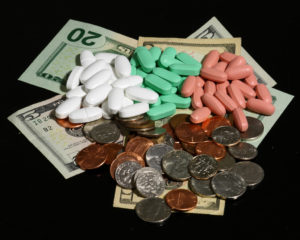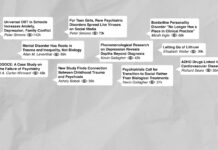Giving money to people diagnosed with severe mental health issues can significantly improve depression and anxiety. A new study, published in the October issue of the Journal of Community Mental Health, found that giving about $73 US dollars per month for recreational spending can also reduce social isolation and strengthen a sense of self.
“This study, as well as other studies, of how people with SMI [“severe mental illnesses”] were affected by and dealt with their difficult financial situation underlines the importance of widening the focus of psychiatry to include people’s social context in professional assessments and in the aggregate knowledge base,” the study authors conclude. “Such a change of perspective would entail viewing some of the difficulties these persons face in the community no longer as individual symptoms and failures alone, but also as a consequence of the actual circumstances in which they live.”
 Research has established a connection between mental health problems and poverty and a higher proportion of people living in economically distressed areas display symptoms associated with “mental illness” diagnoses. Scholars argue over the causal direction of this reality, with some arguing for a “social drift hypothesis,” where mental health issues are thought to precede economic problems, and others for a “social causation hypothesis” that sees economic marginalization as a contributor to the emergence of various symptoms. Still others argue that social and cultural expectations are inherent in the creation of diagnostic labels and that, as a result, individuals who exhibit certain behaviors linked to poverty, race, or gender, are construed as “mentally ill” more often.
Research has established a connection between mental health problems and poverty and a higher proportion of people living in economically distressed areas display symptoms associated with “mental illness” diagnoses. Scholars argue over the causal direction of this reality, with some arguing for a “social drift hypothesis,” where mental health issues are thought to precede economic problems, and others for a “social causation hypothesis” that sees economic marginalization as a contributor to the emergence of various symptoms. Still others argue that social and cultural expectations are inherent in the creation of diagnostic labels and that, as a result, individuals who exhibit certain behaviors linked to poverty, race, or gender, are construed as “mentally ill” more often.
“Regardless of cause,” the researchers write, “one question that has seldom been asked is whether improvements in a person’s economic status might have a positive effect on his or her social relations as well as on other aspects of his or her life.”
To test whether the addition of modest financial support for leisure activities can promote social connections and impact a sense of self, symptoms, and functional levels among those diagnosed with “severe mental illnesses,” the Swedish researchers recruited one hundred participants who were involved in mental health services and social services. For nine months, the participants were offered an additional 500 SEK (≈$73 USD or 53 Euro) to spend on social activities, but they were not required to account for how it was spent.
After seven months, those who received the extra spending money were found to have significant improvements in symptoms, quality of life, sense of self, and social connections compared to those who did not receive the allowance. They did not, however, show an improvement in function over the control condition.
“Reducing relative poverty seems to enable these persons to regain access to and actually make use of different public and private arenas for social exchange,” the authors write. The results suggest that many of the “negative symptoms” associated with mental health problems, like social isolation and lack of initiative, may have more to do with social and economic realities than regularly acknowledged.
“Consequently, these difficulties should not automatically be assumed to be symptoms of a mental disorder but require other explanatory models and initiatives than those currently deriving from psychiatry.”
*
Ljungqvist, I., Topor, A., Forssell, H., Svensson, I., & Davidson, L. (2015). Money and Mental Illness: A Study of the Relationship Between Poverty and Serious Psychological Problems. Community mental health journal, 1-9. (Abstract)















“not generally acknowledged”???? More like suppressed for the benefit of the chemical imbalance theory.
Report comment
The prices of Abilify may vary depending on the dosage of the drug. For example, a 2 mg tablet costs around $24 without insurance. Abilify price will also vary depending on the store that sells the drug.
Price Without Insurance
CVS Pharmacy
2mg 30 tablets $717.30
10mg 30 tablets $717.30
20mg 30 tablets $1,011.76
An examination of costs, charges, and payments for inpatient psychiatric treatment in community hospitals.
Charges were 2.5 times higher than the hospitals’ reported costs to deliver care. Reimbursed amounts indicated by MarketScan were similar to the reported costs to deliver care. The average cost to deliver care was highest for Medicare and lowest for the uninsured: schizophrenia treatment, $8,509 for 11.1 days and $5,707 for 7.4 days, respectively; bipolar disorder treatment, $7,593 for 9.4 days and $4,356 for 5.5 days; depression treatment, $6,990 for 8.4 days and $3,616 for 4.4 days; drug use disorder treatment, $4,591 for 5.2 days and $3,422 for 3.7 days; and alcohol use disorder treatment, $5,908 for 6.2 days and $4,147 for 3.8 days.
http://www.ncbi.nlm.nih.gov/pubmed/22588167
My unwanted hospitalization cost $17,000 the prescriptions I didn’t want were about 1,400 a month.
Instead of a new house they spent the same money trying to pill lobotomize me and even called it “help”.
Not to self: If I ever have a nervous breakdown and drink myself sick again goto AA and stay the hell away from the E.R
Report comment
That UHS hospital was criminal.
They decided who was sick and who was well wile they charged around $800 a day I think for everyone.
My medical records even listed “resistant to placement” (in some overgrown halfway house with 50 troubled men) as a reason I was “sick” and needed to stay longer. Resistant to placement in their kickback operation, and how the hell would the all male and share a room stupid nasty scene help me ?
Lets hang around 50 dudes who all day talk about drugs, tattoos, legal problems , stupid football and listen to fake stories about all the hot chicks those loosers never got and all the other story fabrications. And then there are the self appointed “I am in charge of the place” types to add to the fun. That scene will surely “help” me not want to drink myself into oblivion along with my pill lobotomy.
“Resistant to placement” Ya kind of proves I was sane. Of course I didn’t go.
Anyway my point of all this is that the psych industry makes billions and then just returns people to poverty.
What a waste.
Report comment
I’m so glad you got out, Cat. Best wishes staying fierce and awake and sober. Whether pills or liquor or powder, pushing addiction is a big industry weapon for breaking down cultures and keeping us in line, for sure. xoxox
Report comment
The_cat, you wrote ““Resistant to placement” Ya kind of proves I was sane. ”
I do agree with you. Hanging out with “dudes who all day talk about drugs, tattoos, legal problems (etc)” is the wrong thing to do.
Hang out with the healthy not the sick.
Report comment
Yes, my bill was $62,450! For that amount of money I could have stayed in the best hotel in town, had room service delivered, and eaten steak and lobster for dinner every evening! It was ridiculous. The money was supposed to pay for the stupid groups that I was supposed to attend every day, groups that I could have done a better job at leading than the staff. Give me a break.
Report comment
Another effort to study the obvious. Why is this even a question that anyone has unanswered?
— Steve
Report comment
Right, another blindingly obvious finding that doesn’t need a study to confirm.
Report comment
its obvious but nothing will be done about it. One of the reasons for the prominence of biomedical theories is that it allows politicians and other elites to ignore the fact that cutting wages and benefits is causing huge amounts of suffering. I expect this study will be ignored and then rediscovered a couple of years later.
Report comment
Hmm, but done by who? Probably the government and psychiatrists will do nothing, unless they turn back toward old-timey eugenics arguments of calling *poverty itself* a SIGN of “illness and degeneracy.” (No, please!)
But imagine people using this common ground to network between consumer/survivor and anti-eviction/forclosure mobilizations, building campaigns with better anti-racist analysis. Imagine getting more concerned doctors and scientists active with defending benefits/social security as a public health need, along the lines of the Planned Parenthood doctors now distributing free water filtration to Flint, MI residents. (Can’t pull up the link, but google it! Good stuff!) ….Imagine this being brought into activist circles, to interrupt the narrative of ~”self-care”~ being the answer for “preventing burnout.” Imagine that glory. Okay, 1, 2, 3, go! ^_^
Report comment
“5 Things Nobody Tells You About Being Poor”
Not safe for work language.
http://www.cracked.com/blog/5-things-nobody-tells-you-about-being-poor/
Report comment
http://www.bonkersinstitute.org/cash.html
Since mental illness is a lifelong condition with no known cure, the successful psychopharmacological management of disorders such as depression and anxiety can be challenging. Treatment with medication almost inevitably results in side effects requiring additional medications leading to additional side effects necessitating still more medications in a self-perpetuating cycle which continues until the patient dies or the insurance runs out.
This report discusses two cases in which complete symptomatic relief was achieved following the administration of large sums of money to the patients. The comparative safety, efficacy, and tolerability of cash is assessed. Based on our findings, the clinical utility of monetary incentives in the form of cash deposits or lump sum payments directly to patients should be reappraised as viable alternative therapeutic modalities for the treatment of mild, moderate and severe cases of anxiety with or without co-occurring depression. Cash payment should also be considered the treatment of choice for all major depressive disorders including mild, moderate and severe clinical or sub-clinical depression, depressed moods and dysthymic, cyclothymic or depressive symptoms appearing with or without comorbid anxiety disorders.
Case report 1:
The patient is a 52-year old male with a history of depression. He reported feeling sad at various times throughout his life but did not seek treatment until age 51, when the factory where he had worked for 23 years was permanently shut down, costing him his pension and health insurance the same year his wife was diagnosed with terminal cancer. The patient was initially prescribed Paxil 20 mg, but after complaining of sleeplessness and expressing suicidal ideation, the dosage was increased to Paxil 40mg with Ambien 10mg prescribed for insomnia. Depressive symptoms improved somewhat, but constant diarrhea, headache and nausea grew intolerable, so a switch from Paxil to Zoloft 50mg was tried. Within 5 weeks the therapeutic effects of Zoloft became readily apparent: the patient stopped worrying about the future and no longer seemed concerned about his wife’s failing health. Numerous treatment-emergent side effects were observed but the patient was reassured by his physician that chest pain, skin rash, constipation, tremor, dry mouth, hypertension and palpitations were not life threatening. One month later, pharmacotherapy was discontinued because the patient refused further treatment, claiming to be cured after winning $20 million in the Illinois State Lottery. A computed tomographic brain scan confirmed the patient had indeed fully recovered (see images below).
Report comment
What an interesting website! I’d never heard of “Bonkers Institute for Nearly Genuine Research,” really spot on in its satire, I think.
I looked up its founder, Ben Hansen, and found an interview from 2007 he did for mindfreedom.org. Really interesting guy, seems to be fully enlightened about these issues, from his lived experience. Thanks for posting this link.
Report comment
Is this some kind of joke? “(Mal)treatment” for “serious mental illness” labels causes poverty. Prosperity improves “mental health”. Yeah, sure. I can vouch for that. I mean abduct a person, imprison that person, and torture the person, and you’re not going to make that person rich. This is especially true where you would require the person to pay for his or her abduction, imprisonment, and torture . How do you come back from such mistreatment? Well, some people manage it. A life before, perhaps, now gone. Give the person a steady monthly income. Sure, that helps. Gee. I couldn’t afford the bus before, now I can. Perhaps I should go somewhere, and enjoy something. Yeah, probably. Sure beats moping.
Report comment
Whether we win $500 million or $1 million, about 70 percent of us lose or spend all our money in five years or less. http://www.rd.com/advice/saving-money/13-things-lottery-winners/
Report comment
Wow, this study might be a work of art. Brilliant satire. I mean it! Sign me up for the next clinical trial.
I also want to study if ice cream makes depressed people feel better in a 5 week trial. Does it beat placebo? Antidepressants? Which flavor works best? This thread is making me hungry.
– Saul
Report comment